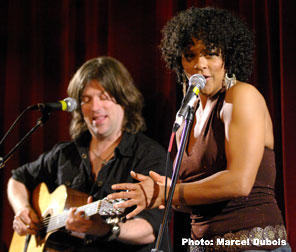
Dawn Tyler Watson’s first big moment as a blues singer came when she was invited to take the stage at the Montreal Jazz Fest in 1998. Watson, who finished a Concordia music degree just four years earlier, walked out on to the Labatt Blues stage in front of 8,000 screaming fans and remembers thinking: “This is crazy. I’m not even a blues singer!”
Now, 13 years, hundreds of shows and countless awards later, Watson still emphatically believes that she didn’t choose the blues: the blues chose her.
“I never decided to become a blues singer, but hey – they didn’t have a school of rock at Concordia!” Watson said with a laugh. She enrolled in the music program, studying theatre as well as music. Watson was still interested in jazz, hip hop and R&B when she completed her degree in 1994, but soon after graduation she was approached to take part in a blues compilation album. The budding musician decided to try her hand at writing a couple of songs. To her surprise, they became big successes, and a blues career was born.
On Saturday night, Watson danced, twirled and sang her way through several sets of music at the House of Jazz in the McGill Ghetto, clearly enjoying every moment, and making it clear that she has no qualms about the path her life has taken. The smiling Watson was dressed in black with plenty of bling, and her crystal ball earrings bounced as she easily worked the crowd. “You want to hear a joke?” she asked at one point. “The Maple Leafs winning the cup!” She broke into infectious laughter before smoothly leading into the next song.
Watson is a successful product of Montreal’s moderately-sized but vibrant blues scene. She has won over 10 major blues awards – including six consecutive Quebec Lys Blues awards – starred in the 2004 film Jack Paradise alongside Roy Dupuis and toured the world. In two weeks, her music will take her to the North Pole, where she will entertain the Canadian Forces. As can be seen, the blues have been good to Watson.
The Montreal blues scene, however, has been suffering in the last two years. Watson said that it’s harder for many musicians to book gigs, and funding has fallen off a little. “It doesn’t seem as easy,” she said.

Her manager Brian Slack, who runs Zeb Productions, confirms that the blues scene has fallen on hard times lately. He blames the tanking U.S. economy, which has caused sponsors to withdraw from the blues festivals which are integral to artist exposure. He says that bars, which he calls “the schooling ground for blues bands,” have also been struggling. All of this adds up to less places for artists to play and make money. Currently, he is booking acts for one of the major blues festivals this summer. He has had over 1,000 submissions for 75 spots.
Still, Slack insists that despite diminished opportunities, the genre is still alive and well. “The scene is inundated with good blues acts,” he said. And he insists that, if given half a chance by the media, blues music would be popular. “So many people see blues at the festivals and absolutely fall in love with the artists,” he says. “But after the summer they go home and forget about it, because the radio won’t play the blues. Getting media attention is the hardest part.”
Slack is working hard to keep the blues in people’s minds after festival season finishes, and he is not alone. A network of groups exist all over the country, including the 150-member Montreal Blues Society, led by President Irene Ippersiel. Her society runs a website and a newsletter dedicated to promoting local artists, as well as helping artists to sell CDs and helping to organize blues series and festivals. She shares Slack’s frustration that blues artists aren’t given the attention she believes they deserve. “It is amazing the talent we have on our doorstep,” she said. “And nobody knows about it.”
Watson believes that the scene in Montreal has a unique feel to it. “I think Quebec people have a real affinity for the blues,” she said. “Maybe its their history, the feelings of conflict and exploitation – I don’t know exactly what it is.”
Slack agrees that this city is a great one for blues music. He describes Montreal music as a little more rock-inspired than the traditional, swing-based blues often heard in Ontario. He says that Montreal is also unique for the amount of money it is willing to put into the arts. “Blues musicians here play in theatres, not just in bars,” he explains. “They can actually get grant money.”
Watson believes that there is no other city where she’d rather play. She has lived in Montreal ever since coming to study at Concordia. “I fell in love with the city, and it’s been good to me,” she says. She is amazed by the warm reception she gets, especially from francophones. Although she is beginning to perform a french song or two, she still writes in English. “Being an anglo, I sing to people who don’t understand the words,” she said. “But they understand the music, they get it.”
The next step for promoters like Slack and Ippersiel and for artists like Watson is to raise the profile of blues music in Montreal and beyond.
“The agents and buyers still think of the blues as bar music,” Slack said. “That is something I am trying to change.”
Watson has encountered the same attitude. “Sometimes I’ll play a gig and people will come up and ask me, ‘What are you doing here? You’re so good,’” she said, shaking her head in annoyance. “They’ll come up to me and say, ‘I hope you make it some day,’” she continued, incredulous. “I am making a living with my art. I have made it.”

Slack agrees that he wouldn’t trade in the blues for anything. “There are tons of possibilities in the blues scene,” he said, “but it’s not glamorous like the rock star Canadian Idol crap.” He says too many other genres of music are run by “business people, not music people.” Unlike blues labels and promoters, too many other genres try to find the next big overnight sensation. “They buy into the American Idol mentality, just throwing up an artist to see if they stick. And when they fall, they throw another one up there.”
Slack will stick to the blues scene, where artists may have to spend time paying their dues on the bar circuit, but will be given time to develop, and have a slightly less lucrative, but also less risky career. “This is probably the best music in the world,” he said emphatically. “And it will always bounce back, always be around. It may make less money, but it’s sure[ly]more fun.”
Watch Dawn Tyler Watson sing the blues here: dawntylerwatson.com/music.html




Comments are closed.